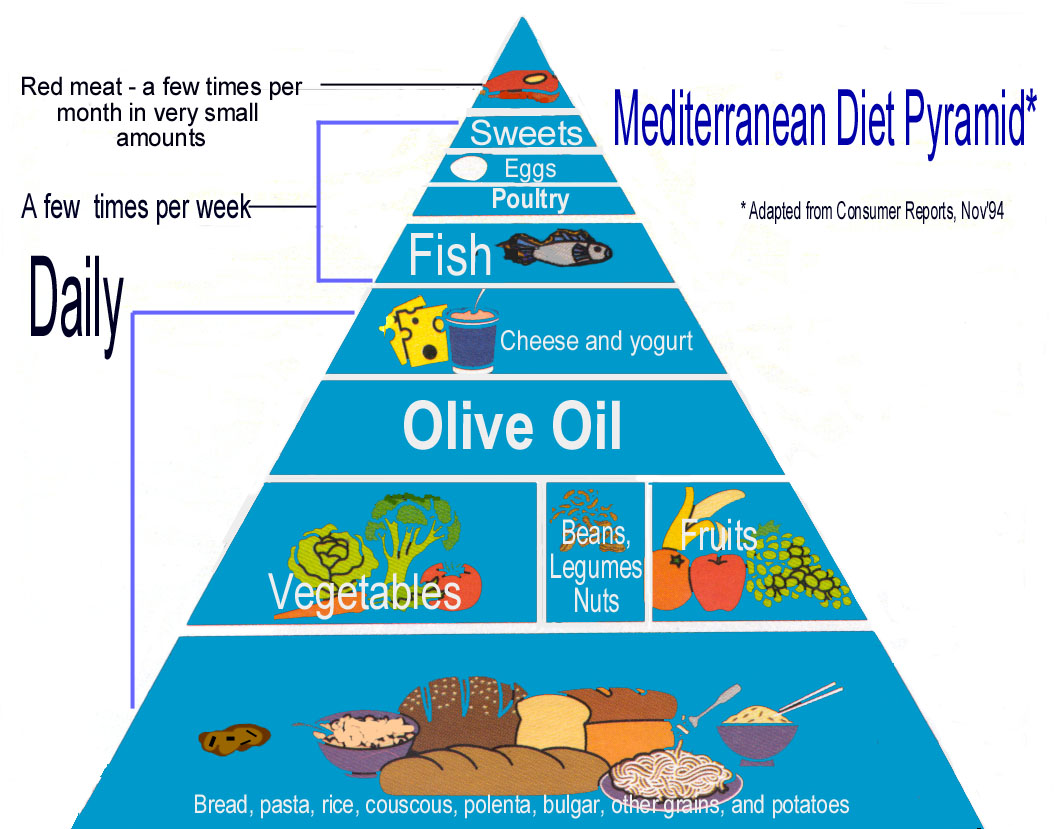The Mediterranean Diet
Can it Reduce Your Risk for Heart Disease?
Higher in fat (40%) than the 30% recommended by the American Heart Association, the Mediterranean diet is gaining in popularity as a tasty, heart-healthy alternative to low-fat eating. The diet is from the Greek island of Crete where Cretans and other Greeks live longer than any other populations in the world - and - they are 20% less likely to die of coronary artery disease than Americans. They also have 1/3 less cancer than in the U.S. Is the Mediterranean way a better way to eat? Let's look at the Mediterranean Diet Pyramid (below) and compare it to the United States Department of Agriculture (USDA) Food Guide Pyramid.

Mediterranean Diet Pyramid copyright © 1994 Oldways Preservation & Exchange Trust http://oldwayspt.org.
Pyramid artwork redesign copyright ©1999 WHF. |
Note 1: The authors of the Mediterranean pyramid recommend regular physical exercise, drinking 6 glasses of water a day and moderate consumption of wine. Purple grape juice may offer the same heart health benefits of red wine without the concerns of alcohol.
Note 2: Other oils rich in monounsaturated fats, such as canola or peanut oil, can be substituted for olive oil. People who are watching their weight should limit their oil consumption.
How does the Mediterranean Pyramid differ from USDA Food Guide Pyramid?
- Both pyramids recommend eating lots of fruits, vegetables and whole grains, but the Greeks ate very little red meat, and, they consumed far more plant foods - averaging nine servings a day of antioxidant-rich vegetables.
- The Greeks ate cold water fish several times a week - another heart-healthy investment since fish contain omega-3 oils that not only reduce heart disease risk but also boost immune system functioning.
- The USDA Food Guide Pyramid groups high protein foods together and does not separate out the red meat from the heart-healthy fish and nuts.
- The Greek diet contains little of the two kinds of fats known to raise blood cholesterol levels: saturated fat and trans fat (also called "hydrogenated or partially hydrogenated oil" in the ingredients section of food labels). The USDA Food Guide Pyramid does not make the distinction between the healthy fats like monounsaturated oils and the unhealthy fats like saturated (found mostly in red meats and tropical oils) and trans fats (found mostly in margarines, snack foods, processed peanut butter and commercial baked goods). Both recommend limiting total fat if watching weight.
What we can learn from the Mediterranean diet about reading food labels?
Understanding the differences in kinds of fats and knowing how to read and interpret food labels can help one become a smarter food shopper. Look for snack chips without hydrogenated or partially hydrogenated oils (check the ingredients section). Try natural peanut butter instead of the pasty, hydrogenated kind. Alter recipes whenever possible to replace unhealthy fats with healthy fats like olive, canola or peanut oil. Use butter very sparingly or use butter flavoring. Don't believe "Fat Free" or "Cholesterol Free" labeling means that a the product is good for you. Many of these items are made with hydrogenated or partially hydrogenated oils and they have "empty calories" that can raise blood triglyceride levels.
Is this a good diet for people with known heart disease?
In one study, French researchers assigned 600 heart attack survivors to follow either a Mediterranean diet or a regimen similar to the one recommended by the U.S. Government and American Heart Association. The short-term results were virtually the same: both diets reduced cholesterol levels by comparable amounts, but the long-term results were surprising. Only 8 new heart attacks occurred over the next two years in the Mediterranean group, compared to 33 in the other group. What the researchers don't mention, however, is the gender of participants. Statistically, women are at much greater risk of suffering a second heart attack. Another consideration is that heart disease is multi-factorial. Diet is just one factor. Family history, lifestyle and blood pressure management are other risks.
What about wine?
The authors of the Mediterranean Diet Pyramid recommend moderate consumption of wine. The American Heart Association recommends drinking in moderation. Most Mediterranean people drink with their meals. Consuming an alcoholic beverage in moderation means drinking no more than one glass of beer, wine or a cocktail a day for a woman and two for a man. This may reduce heart attack risk by raising HDL levels somewhat and by inhibiting blood clotting, however, alcohol is addictive and can lead to destructive behavior. Over-consumption can cause high blood pressure and weakening of the heart muscle. Studies suggest drinking grape juice can have the same beneficial effect as drinking wine. OPC's (Oligomeric Proantho Cyannidins) are located in the skin and seeds of grapes and are powerful free radical quenchers. If you do drink, do so in moderation. If you don't drink, don't start. Drinking purple grape juice may be a healthier alternative for some.
If you would like to try eating the Mediterranean way, visit www.amazon.com and do a search for books on the topic of Mediterranean diet.

 Free Forum Hosting
Free Forum Hosting